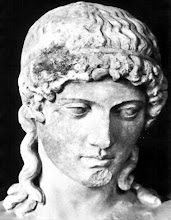
Four hundred and six years ago yesterday, one Guy Fawkes was arrested and brought in front of the then king of England, James I, for his participation in a plot to blow up the Westminster Parliament. A few months later, he and his accomplices were found guilty of high treason and duly hanged, drawn and quartered. Sounds a bit unpleasant as a punishment, doesn't it? Don't worry, it's only an expression. The people thus sentenced were in fact tied behind horses who drew them to their place of execution, hanged almost to the point of death, emasculated, disembowelled, beheaded and then only quartered, which is as you would imagine chopped into four pieces. So they did not really suffer during that last bit (it's bad for the meat).
You'd think that after all that, Guy Fawkes had been punished enough. But every year since then, on November 5th, adults and children all over the UK have celebrated the "happy ending" by burning him in effigy, as well as organising fireworks displays, and of course lighting lots of firecrackers. There used to be a part about going around in the neighbourhood with the effigy, asking for "a penny for the Guy", but I guess Hallowe'en has now taken over as far as groups of begging children are concerned.
Maybe it's the gruesome execution, maybe it's the fact that a few historians have questioned the reality of the plot, maybe it's because of all the noise made by the revellers, but I had never been too keen on Bonfire Night celebrations. Isn't it a bit inconsistent to celebrate with so many explosions the thwarting of an attempt to blow up parliament? Not to mention that November is a strange time to have so many fireworks, especially in a place where it rains so often...
Recently though, the symbolism of Guy Fawkes has been turned on its head. Ever since the release of the comic book V for Vendetta, where a man disguised as Fawkes fights almost single-handedly a fascist government in the UK and succeeds in blowing up the Palace of Westminster, people have started to identify with Guy Fawkes rather than celebrate his death. Masks like the one above have become anti-greed symbols, and they are selling like hotcakes (yes, there is a bit of irony in that). As a Frenchman, I am bound to feel more sympathy with that point of view: we like to celebrate the toppling of kings and the storming of their fortresses, not their victories.
You'd think that after all that, Guy Fawkes had been punished enough. But every year since then, on November 5th, adults and children all over the UK have celebrated the "happy ending" by burning him in effigy, as well as organising fireworks displays, and of course lighting lots of firecrackers. There used to be a part about going around in the neighbourhood with the effigy, asking for "a penny for the Guy", but I guess Hallowe'en has now taken over as far as groups of begging children are concerned.
Maybe it's the gruesome execution, maybe it's the fact that a few historians have questioned the reality of the plot, maybe it's because of all the noise made by the revellers, but I had never been too keen on Bonfire Night celebrations. Isn't it a bit inconsistent to celebrate with so many explosions the thwarting of an attempt to blow up parliament? Not to mention that November is a strange time to have so many fireworks, especially in a place where it rains so often...
Recently though, the symbolism of Guy Fawkes has been turned on its head. Ever since the release of the comic book V for Vendetta, where a man disguised as Fawkes fights almost single-handedly a fascist government in the UK and succeeds in blowing up the Palace of Westminster, people have started to identify with Guy Fawkes rather than celebrate his death. Masks like the one above have become anti-greed symbols, and they are selling like hotcakes (yes, there is a bit of irony in that). As a Frenchman, I am bound to feel more sympathy with that point of view: we like to celebrate the toppling of kings and the storming of their fortresses, not their victories.

No comments:
Post a Comment